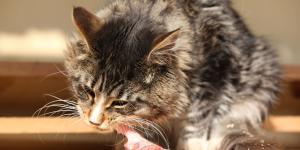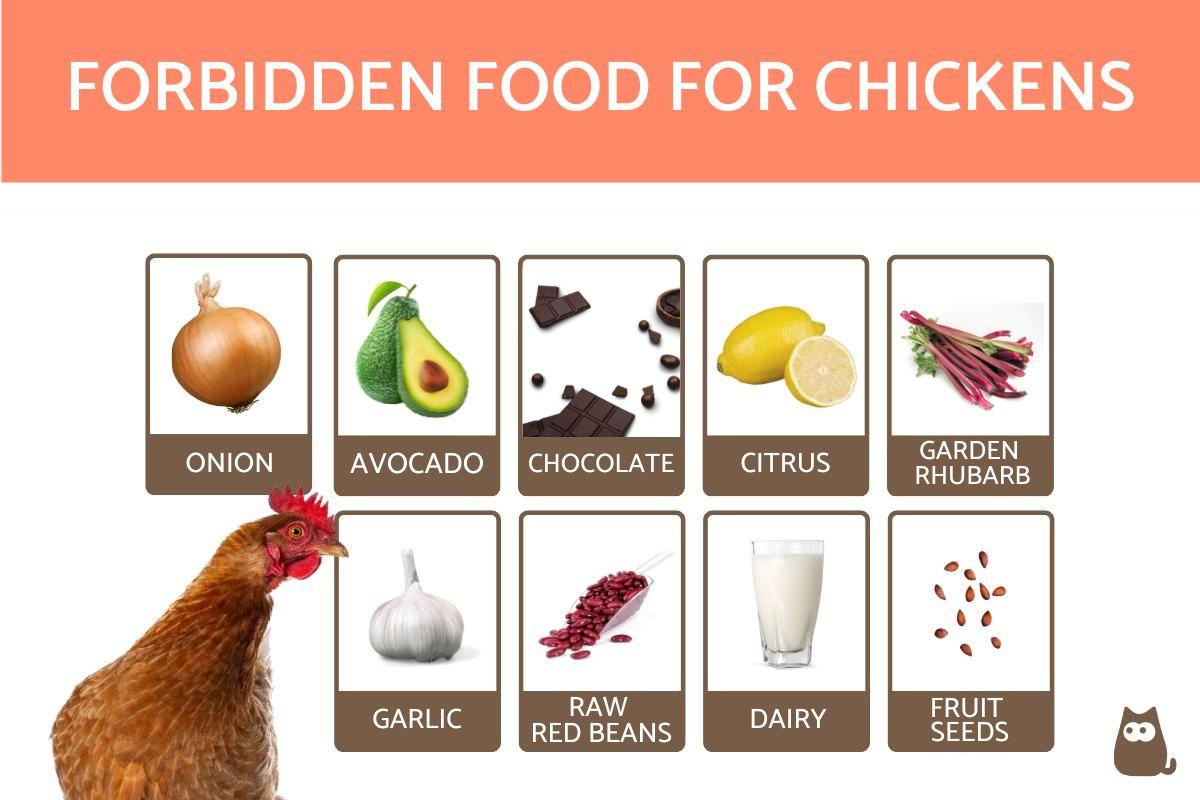Forbidden Foods for Chickens

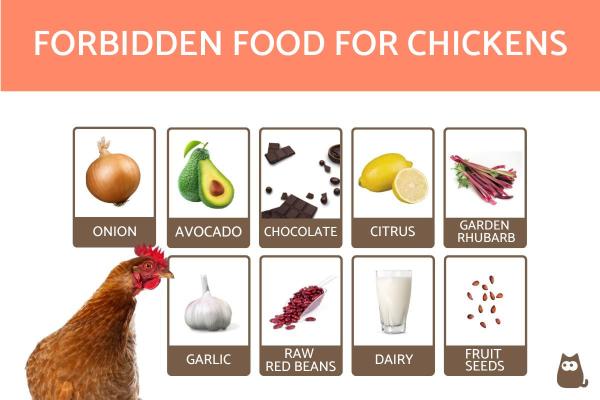
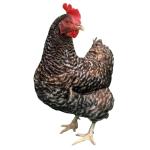
See files for Hens and roosters
Chickens, being omnivorous creatures, have a wide-ranging diet that encompasses cereals, vegetables, fruits, seeds, meats, fish, legumes, and even eggs. However, this dietary diversity doesn't mean they can consume everything we do. Some common human foods are not recommended for them, primarily due to potentially toxic substances in their composition.
In this article by AnimalWised, we'll delve into what chickens should avoid eating and why. By understanding these dietary restrictions, we can provide a healthy and safe diet for the chickens that have become increasingly popular as pets.
- Onion
- Garlic
- Avocado
- Citrus
- Nightshade plants
- Garden rhubarb
- Raw red beans
- Dairy
- Fruit seeds
- Chocolate
- Moldy food
- Salt, sugar and fats
Onion
Onions, typically a staple in human cuisine, fall into the category of foods that require moderation when it comes to offering them to your feathered companions.
The reason for this caution is a substance found in onions called thiosulfate. Although harmless to humans, thiosulfate can be problematic for chickens when ingested in excessive amounts. Chickens are curious creatures, and they may peck at onions if they encounter them in their environment or as part of kitchen scraps.
Consuming large quantities of onions can lead to health issues in chickens. Thiosulfate can adversely affect their red blood cells, potentially causing anemia, weakness, and digestive distress. In severe cases, onion consumption can prove fatal for chickens.
Garlic
The use of garlic in chicken diets is a topic that often sparks debate among poultry enthusiasts. Garlic, like onions, contains thiosulfate, although in smaller quantities. It's important to weigh the potential benefits and risks associated with its consumption by chickens.
In traditional practices, small amounts of garlic have been used for internal deworming in chickens. When administered in controlled and modest quantities, garlic is generally considered safe and may even offer some health benefits. However, it's crucial to maintain a careful balance, as excessive garlic consumption can become problematic for chickens.
Garlic's thiosulfate content, though lower than that of onions, can still affect chickens if ingested in large amounts. High doses of garlic may lead to digestive issues, anemia, and even potential toxicity. Therefore, it is essential to control garlic consumption and not exceed recommended quantities.
If you're considering adding garlic to your chickens' diet, it's advisable to consult with a veterinarian or poultry expert first. They can provide guidance on the appropriate dosage and frequency, taking into account the specific needs of your flock.
Avocado
While avocados are celebrated as a nutritious and delicious addition to human diets, they harbor a dark secret when it comes to our feathered friends, especially chickens. Avocados can be exceedingly toxic to chickens, posing severe health risks that should not be underestimated.
The primary reason for this toxicity is a substance called persin, which is present in avocados. Persin can have devastating effects on domestic birds like chickens, leading to a range of alarming symptoms and, in some cases, a swift and tragic demise. Here's a closer look at the potential consequences of avocado consumption for chickens:
- Difficulty standing: chickens exposed to persin may experience difficulty in maintaining their balance and standing upright, a clear sign that something is amiss.
- Respiratory distress: avocado-induced persin toxicity can lead to noticeable changes in a chicken's breathing patterns, causing respiratory distress and discomfort.
- Fluid accumulation: one of the most concerning effects of persin is the accumulation of fluid around vital organs, particularly the heart and lungs. This condition, known as pericardial and pleural effusion, can severely impair the bird's ability to function normally.
- Organ failure: the toxicity of persin can result in liver and kidney failure, further compromising the bird's overall health and well-being.
- Sudden death: tragically, chickens exposed to avocados and the toxic persin can succumb to the effects within as little as 24 to 48 hours, leading to sudden and unexpected deaths.
It's important to note that persin is not limited to just one part of the avocado—it can be found throughout the entire fruit and the plant. Therefore, it is imperative for chicken owners to be acutely aware that avocados are one of the foods that chickens should never consume.
Citrus
The inclusion of citrus fruits in chickens' diets can be a topic of debate among poultry enthusiasts. While these fruits are generally not toxic to chickens, they often exhibit little interest in consuming them, and there may be good reasons behind their reluctance.
One primary factor contributing to chickens' aversion to citrus fruits is their acidic taste. The acidity of fruits like lemons, limes, and oranges can be unappealing to chickens and may even have adverse effects on their digestive systems.
It's essential to respect the natural preferences of your flock. If your chickens show no inclination to eat citrus fruits, there's no need to force them to do so. Chickens are selective eaters, and their dietary choices are often based on instinctual preferences and nutritional needs.
Attempting to compel chickens to consume citrus fruits may lead to stress or discomfort, potentially affecting their overall well-being. Instead, focus on providing a well-balanced diet that includes a variety of poultry-appropriate foods, ensuring they receive the necessary nutrients without imposing unfamiliar or unpalatable options.
Nightshade plants
Nightshade plants, such as tomatoes, peppers, potatoes, and eggplants, do contain solanine, a natural alkaloid compound that can be toxic to birds when consumed in large quantities or in the case of the leaves and stems.
It is generally safe for chickens to consume the fruits of these nightshade plants in moderate amounts. However, it's crucial to be cautious when it comes to the green parts of potatoes and eggplants, as they may contain higher concentrations of solanine, which can be harmful.
A critical point to note is that when feeding potatoes and eggplants to chickens, it's essential to inspect them for any green portions. Green areas in potatoes and eggplants can indicate the presence of solanine and should be removed or cooked thoroughly to eliminate the risk before offering them to your birds.
Explore the intriguing topic of chicken reproduction in our other article, where we explain how chickens reproduce.
Garden rhubarb
Garden rhubarb, known scientifically as Rheum rhabarbarum, is a plant that demands special attention when it comes to chickens' diets. This plant contains high levels of oxalic acid, a substance with the potential to wreak havoc on the liver and kidneys of chickens.
What sets garden rhubarb apart as a danger to chickens is that every part of the plant, including the leaves, harbors potentially toxic amounts of oxalic acid. Due to this inherent risk, garden rhubarb should be firmly classified among the foods prohibited for chickens.
Ensuring that chickens do not ingest any part of the garden rhubarb plant is essential to safeguard their health and well-being.
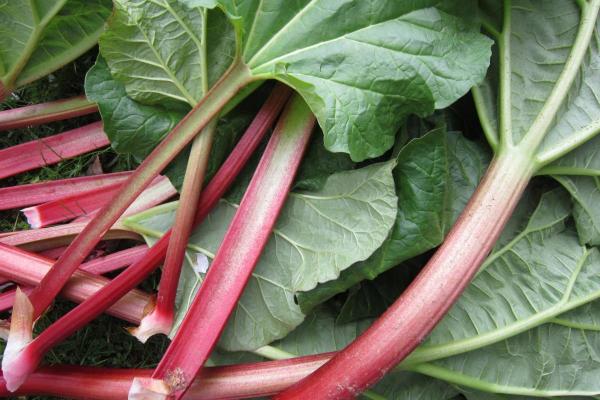
Raw red beans
Red beans, like various other legumes, can be a valuable part of a chicken's diet, providing essential nutrients and protein. However, there's a critical caveat to consider when offering them to your feathered companions: red beans should always be thoroughly cooked before consumption.
The reason for this precaution lies in a substance called phytohemagglutinin, which is present in raw or undercooked red beans. Phytohemagglutinin can be harmful not only to chickens but also to humans, causing gastrointestinal symptoms such as nausea, vomiting, and abdominal pain.
Cooking not only makes red beans safer for chickens but also enhances their digestibility, ensuring that your birds can reap the nutritional rewards without any adverse effects. This cautionary note extends to other legumes as well. It's advisable, as a precautionary measure, to cook all legumes thoroughly before including them in your chickens' diet.
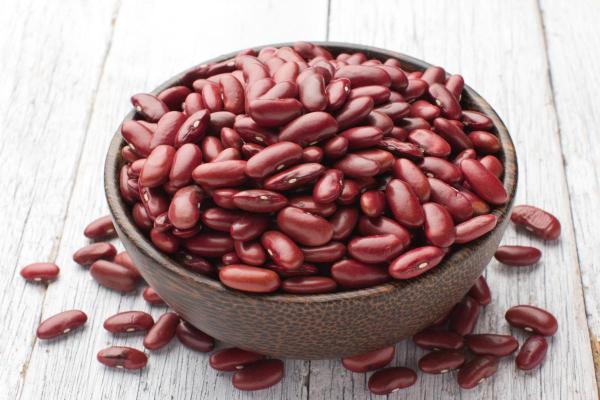
Dairy
Dairy products are not inherently toxic to chickens, but they possess a unique characteristic that can lead to digestive issues in these feathered friends. The culprit here is lactose, a type of sugar found in milk and dairy items. Chickens lack the necessary enzymes to effectively digest lactose, which means that consuming dairy products may result in digestive problems, including diarrhea.
It's essential to recognize that not all dairy products contain the same amount of lactose, and the severity of potential harmful effects can vary depending on the specific product. Common dairy items like milk, yogurt, and cheese can affect chickens differently due to their lactose content.
To offer dairy products to chickens while minimizing the risk of digestive disturbances, consider using lactose-free varieties available in the market. These options are formulated specifically for individuals, like chickens, that struggle to digest lactose. However, even with lactose-free options, it's advisable to treat dairy products as occasional treats rather than staples in the chickens' diet.
Fruit seeds
Fruits like apples, cherries, plums, peaches, and others offer numerous nutritional benefits for chickens. However, it's crucial to be aware of a potential hazard lurking within these fruits—the seeds or pits. These seeds contain a compound known as cyanide, which can be harmful when ingested.
While chickens can indeed benefit from the consumption of these fruits, they should only be offered after the seeds have been thoroughly removed. This precautionary step eliminates the potential for cyanide exposure and ensures that the fruits are a safe and nutritious addition to the chickens' diet.
Discover more about the differences between rooster and hen in our other article.
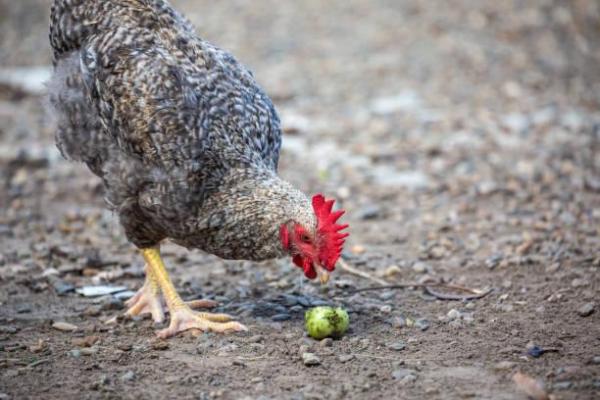
Chocolate
Chocolate, a beloved treat for humans, harbors hidden dangers when it comes to our chickens. This danger arises from two substances found in chocolate—caffeine and theobromine. These compounds can have varying levels of toxicity, depending on factors such as the amount ingested and the type of chocolate consumed, with darker chocolates containing higher levels of these toxic compounds.
The harmful effects of chocolate are not solely confined to caffeine and theobromine; other ingredients, such as milk, found in chocolate can also be detrimental to animals.
Chickens exposed to chocolate may exhibit a range of symptoms, including agitation, rapid heart rate (tachycardia), seizures, and, in extreme cases, even death.
Considering these significant health risks, chocolate unequivocally falls into the category of prohibited foods for chickens. It is crucial to ensure that chickens do not have access to chocolate in any form.
Moldy food
Moldy food can be perilous for chickens due to the presence of mycotoxins, toxic compounds produced by certain molds. The consequences of ingesting mycotoxin-contaminated food can be severe and include symptoms such as vomiting, nervousness, coordination problems, tremors, seizures, and an increase in body temperature.
To ensure the health and well-being of your chickens, it's vital to regularly inspect their feeders and waterers, keeping them free of any mold or spoiled food. This proactive measure helps protect your feathered companions from potential mycotoxin exposure and its adverse effects.
By maintaining a vigilant eye on their food and water sources and promptly removing any spoiled or moldy items, you play a crucial role in safeguarding the health of your beloved poultry.
Salt, sugar and fats
The food we provide to our chickens plays a pivotal role in their health and well-being. While certain foods may not be toxic, their excessive consumption can lead to health problems. It's crucial to offer chickens clean and well-balanced diets that are free from excessive salt, sugar, or fat. Additionally, it's best to steer clear of ultra-processed products.
Excessive salt, sugar, or fat can lead to various health issues in chickens when consumed in large amounts. To maintain the optimal health of your flock, prioritize offering them foods that are as "clean" as possible, without unnecessary additives or excesses of these substances.
Importantly, it's essential to refrain from feeding chickens with leftover food from our diets. Establishing a well-balanced diet for your chickens with quality ingredients designed exclusively for them is the best practice for their overall health and longevity.
Can chickens eat bread?
Chickens can eat bread in moderation as an occasional treat. However, it should not be a primary part of their diet. Fresh, whole grain bread is a better choice than highly processed varieties. Ensure it's not moldy and offer it alongside their regular, nutritionally balanced feed for a diverse diet.
Uncover the intriguing reason behind why do roosters crow in the morning by reading our informative article.
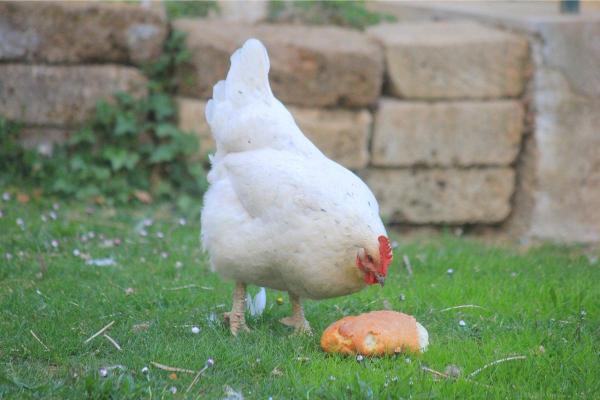
If you want to read similar articles to Forbidden Foods for Chickens, we recommend you visit our Homemade diets category.
- Pet Poison Helpline . Available at https://www.petpoisonhelpline.com/




